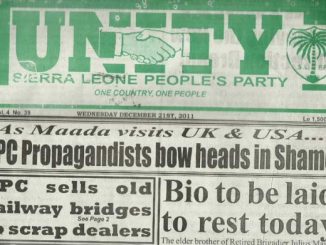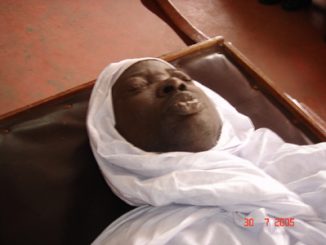
Bio’s Audit Report 2021 Exposes Huge Financial Malpractices at Several Sierra Leone Embassies
Culled from The Organizer Newspaper
Several Sierra Leone diplomatic missions have been tagged with massive corruption thanks to the fraudulent SLPP govt of President Bio.


By Chris Wizo.
This disgraceful report includes significant issues and matters that have flagged the prevalence of massive financial irregularities at several diplomatic missions ranging from the Embassy in Washington DC, Sierra Leone’s Permanent Mission to the United Nations in New York, the Embassy in Seoul South Korea, the Embassy in Brussels to Sierra Leone’s High Commission in the United Kingdom. The full report on this fraudulent financial occurrence is as follows by Chris Wizo –
Audit Service Sierra Leone has in line with Section 119(2) of the 1991 Constitution audited the Public Accounts of Sierra Leone and presented its report to the country’s house of representatives (Parliament). The Annual Report for the year ended 31st December 2021 contains the overall result of the institution’s work for 2021. It includes the audit of the Public Accounts of Government Ministries, Departments, and Agencies (MDAs), as well as Diplomatic Missions, Local Councils, and schools. One of the most outstanding issues flagged by the report is that Consular Funds were collected but not transferred into the Consolidated Fund as provided for in Section 49(10) of the Public Financial Management Regulations (PFMR) of 2018
It stipulates that “when public monies are paid into accounts other than the Treasury Account where the BSL is not operational, those accounts shall only be for transitory purposes, and all balances shall be transferred to the Treasury Main Account or other designated Treasury account within twenty-four hours of receipt, except when otherwise approved by the Accountant General”. According to the Auditor General’s Report (2021) “contrary to this provision, and despite repeated recommendations in previous audit reports, revenue collected by the Embassies were not fully paid into the Consolidated Fund. Instead, these funds were withdrawn from the Consular Account and utilised in the operations of the Missions without authorisation from the Ministry of Finance (MoF)”.
Sierra Leone Embassy, Washington DC: June 2018 – December 2021
In the Washington, DC Embassy payments were made to staff after recall from Tour of Duty during the period under review. The report found that huge salaries and leave allowances amounting to US$220,825.83 was paid to a certain Fatmata Dao after the end of her foreign service duty tour at the Embassy. It states that she was recalled to headquarters and paid her repatriation allowance on 17th September 2017. The decision to pay this staff the report establishes was contrary to the recommendations in the previous audit report and there was an absence of evidence to show that the staff was performing duties at the Embassy for this payment to have been authorised. (Photo: President Bio and his thieving wife Fatima Bio).

“This is an additional financial burden on the government’s meagre resources which could have been used for other developmental activities,” 2021 Audit Report. In response to these findings, the embassy management submitted justifications and supporting records as evidence of the observations on illegal payments to staff after a recall from the tour of duty. A further review of the submissions revealed that Since Fatmata Dao was recalled from overseas duty and was paid repatriation allowance before approval of study leaves with pay, the Audit Service Sierra Leone is of the view that salary and any other payments made to her should have been based on her new assignment and location, but not as a staff of the Embassy.
Sierra Leone’s Permanent Mission to the United Nations New York: June 2018 – December 2021
In the country’s Permanent Mission to the UN in New York, the audit activity discovered that payments of refunds totalling US$13,501.22 were made to the Former Financial Attaché for various expenditures incurred without due authority. In addition, there were no payment vouchers, supporting documents, or requests to support such refunds. The report also discovered that special imprest was poorly managed. “Relevant supporting documents such as payment vouchers, receipts, claim sheets, etc., were not submitted to justify the utilisation of funds totalling US$55,274.50 and US$78,057 spent toward activities of the General Assembly meeting in 2018 and 2019 respectively.
Sierra Leone Embassy, Seoul, South Korea: January 2014 – December 2021
In the Embassy in Seoul, the audit report noted that the manner in which consular funds were accounted for was ‘extremely doubtful and suspicious’. This report justified by indicating that Consular Funds as per the Embassy’s cashbook exceeded the bank statements of same by US$7,519.52. This means that this money was generated but neither banked nor brought to account. “Consular funds as per the Embassy’s bank statements exceeded the funds remitted into the Consolidated Fund at the Bank of Sierra Leone by US$35,700. This amount which was withdrawn without any authority from the relevant Ministry was also not brought to account”. The auditors recommend that the total unaccounted consular funds of US$ 43,219.52 be refunded by the officer/diplomat who was involved in the management of consular funds between August 2014 and October 2019.
The auditors also observed that funds amounting to KRW88,274,258 (an equivalent of US$77,095.42) were withdrawn from the Embassy’s humanitarian account on diverse dates during the review period. However, the documentary evidence to support these withdrawals was not made available for inspection. In its official response, the management noted that the Embassy did receive the sum of Kw100,000,000 the equivalent of US$100,000 from philanthropists in South Korea. This amount was immediately remitted to the Ministry of Foreign affairs through the Disaster Relief Support Sierra Leone Commercial Bank.
It further noted that as a result of the complexities of using similar bank books while doing transactions at the bank may have resulted in the depositing of such monies and subsequent withdrawals. This may also have occurred as a result of doing transactions with tellers who do not speak English which may have complicated the transactions in exchange for different books. The auditors confirmed that they were not able to relate the management’s response to the audit finding. In addition, management failed to make the supporting documents available for verification, therefore the issue remains unresolved.
Sierra Leone Embassy, Brussels: June 2018 – December 2021
In the Brussels Embassy the auditors discovered payment of children and education allowances without evidence of birth certificates totalling €16,863.27 and €61,359.51 paid as children and education allowances respectively to personnel that did not provide their children’s birth certificates. “Without evidence to support the said payments, we could not confirm whether the personnel was entitled to children and education allowances. We recommended that the officers concerned should submit the birth certificates of their children. Otherwise, the amount should be refunded,” the report recommended.
The report also brought to the fore the issue of Special Imprest amounting to €40,141.47 expended by the embassy on the visits of the President to France during February 2020 documents for the said amount were not presented for inspection, contrary to Section 124(1) of FMR of 2018 which stipulates that special imprest must be retired at the end of the activities or purpose. The report recommends that the Head of Chancery (HoC) submit the retirement details and records to support imprest funds utilised by the Embassy. Otherwise, the amount involved should be paid back or refunded by the Financial Attaché into the Consolidated Fund.
Sierra Leone High Commission, United Kingdom: June 2018 – December 2021
In the country’s High Commission in the UK, it was discovered that Internal payment vouchers totalling £70,848.73 were processed for several transactions for the period under review, but were without supporting documents i.e. initial request and approval from the voting controller. The auditor also discovered that total refunds of £23,719.56 were made to some staff for various expenditures incurred on the activities of the High Commission. However, there was no prior authority/approval from the HoC to undertake such expenditures, thereby validating such refunds, which were not submitted.
The audit report recommends that the HoC, in collaboration with the Foreign Affairs Ministry ensure that evidence of the initial request and the vote controller’s approval for transactions on the internal payment vouchers are submitted for audit. Insisting that prior approval/authority from the HoC should also be submitted for audit; otherwise, the amount should be recouped from the staff involved, paid into the Consolidated Fund, and evidence submitted for audit v



